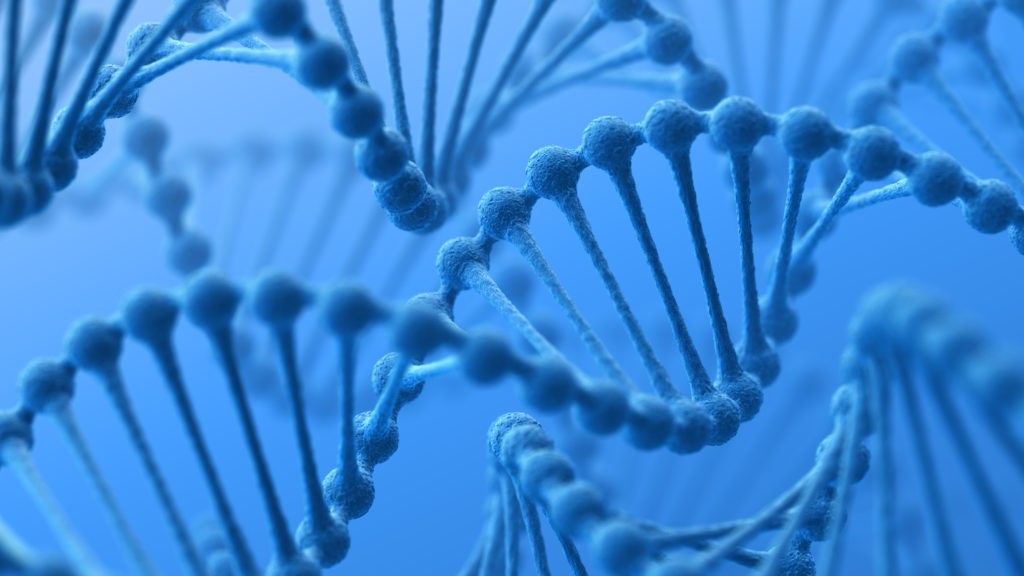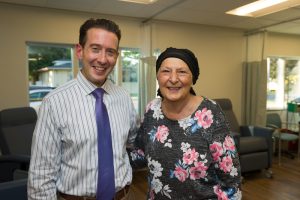
Early Signs of Inflammatory Breast Cancer
Regional Cancer Care Associates (RCCA) provides comprehensive treatment of cancer and blood disorders to patients throughout New Jersey, Connecticut, Maryland, and the Washington, DC, area.
Questions on Oncology, Hematology and/or Infusion Clinical Services due to COVID-19 Crisis – CALL 833-698-1623
Important Information for Our Patients Regarding the Coronavirus.
RCCA Providing Area Cancer Patients with Access to Care During Coronavirus Outbreak
RCCA Offering Patients Virtual Visits During Coronavirus Pandemic
Our genes are responsible for our eye color, hair color, height, and other traits. But they can also be responsible for putting us at increased risk for certain conditions—like breast cancer—if we inherit a gene that has an abnormality.
According to the American Cancer Society, between 5% and 10% of all female breast cancers are caused by abnormal genes, also called mutations or variants. The two most common gene mutations linked to breast cancer—as well as to ovarian cancer—affect the BRCA1 (Breast Cancer gene 1) and BRCA2 (Breast Cancer gene 2) genes.
About 13% of all women will develop breast cancer at some point in their lives. Most who do are ages 50 years and older and don’t have a gene mutation. However, women who have inherited a BRCA mutation are much more likely to develop breast cancer than women who don’t have a mutation—and the disease often strikes them at a younger age. According to the National Cancer Institute, 55% to 72% of women with a BRCA1 mutation will develop breast cancer, and 45% to 69% with a BRCA2 mutation will develop the condition.

But Dongmei Wang, MD, a board-certified medical oncologist, points out that if you’re found to have a BRCA or other gene mutation, it doesn’t mean that you necessarily will develop cancer. Instead, “It gives you more information about your degree of risk, enabling you to plan – and act — accordingly. It does not mean that you are a breast cancer patient,” says Dr. Wang who practices in the Rockville, MD offices of Regional Cancer Care Associates, LLC (RCCA), one of the nation’s largest networks of cancer specialists. Once you’re armed with the knowledge that you harbor a gene mutation, she says, you can take steps to significantly reduce your odds of developing breast cancer, such as risk-reducing surgery, medications, and/or enhanced screening.
Looking to the past to assess your future risk
So how do you know if you have a gene mutation that could increase your likelihood of developing breast cancer? Genetic testing is the only way to know for certain. However, several red flags may suggest the presence of a breast cancer gene mutation in your family. Consider asking your doctor to assess your risk if you have:
Certain ethnic and racial groups are more likely to have gene variants. People of Ashkenazi Jewish descent are 10 times more likely to have a BRCA variant than those in the general population. Another BRCA gene variant is seen in African-Americans but not in other ethnic and racial groups.
The U.S. Preventive Services Task Force (USPSTF), a federal advisory panel of medical experts, recommends that women 18 years and older who have a personal or family history of breast, ovarian, fallopian tube, or peritoneal cancers or who have an ancestry such as Ashkenazi Jewish that puts them at an increased likelihood of a BRCA mutation should have their doctor assess their risk for breast cancer. A risk assessment can help determine if they should undergo gene testing, which is performed using a blood or saliva sample.
Getting genetic counseling
The decision to obtain a genetic test shouldn’t be made without taking several factors into consideration. That’s why the USPSTF and other experts recommend that anyone considering being tested undergo genetic counseling first. Ethan Wasserman, MD, a board-certified medical oncologist who practices with RCCA in Monmouth and Ocean counties in New Jersey, agrees. “I strongly encourage women with breast cancer or any of my patients talking about genetic testing to get genetic counseling first,” he says.
Your doctor can refer you to a board-certified genetic counselor who can explain to you and your family the benefits and risks of testing, the likelihood of a mutation being found, the limitations of genetic testing, and the treatment options available if a mutation is found. By obtaining a thorough family cancer history, genetic counselors can better recommend who is the optimal person, or people, within a family to test. This can lead to an increased likelihood of a clinically significant mutation being identified.
A genetic counselor will help you prepare for the emotional impact—which can include distress, anxiety, fear and uncertainty—on you and your family if a gene mutation is found. However, because getting tested is your personal decision, you have the right to decline a recommended test or delay testing.
Joel Silver, MD, a board-certified medical oncologist with RCCA in West Hartford, CT, says some women might hesitate to undergo gene testing because they’re concerned they could lose their health insurance or job if the results are positive. But, he says, “their medical insurance can’t be removed. Also, under federal law, they can’t get fired because they have a mutation.” The Genetic Information Nondiscrimination Act (GINA) states that health insurance companies and most potential and current employers with 15 or more employees can’t deny people health insurance or a job. However, the law doesn’t prevent companies from turning you down for life and disability coverage, nor does the law apply to people serving in the military.
If you’re tested and found to carry a gene mutation, you’ll be advised to share the results with your family members because they may have the same mutation and need to take precautions to lower their cancer risk. For example, each of your children stands a 50% chance of having the same mutation as you do. A genetic counselor can help you find the best way to communicate the implications to your relatives, including your children and any estranged family members.
The DNA-testing company 23andMe offers at-home BRCA1 and BRCA2 testing kits approved by the Food and Drug Administration, which you can order without a doctor’s prescription. However, the direct-to-consumer test has limitations: It detects just three BRCA mutations, which are associated predominantly with Ashkenazi Jewish heritage. It also doesn’t require pre- or post-genetic counseling. The lack of counseling concerns Deena Graham, MD, a board-certified medical oncologist and hematologist who practices at RCCA’s Hackensack and North Bergen, NJ care centers. “Patients may be receiving information that they are not sure what to do with, and then they still don’t have access to a provider to discuss it with them.” In some situations, however, such as when a woman doesn’t have access to genetic testing, a direct-to-consumer test could be useful, says Dr. Graham.
What other gene mutations increase risk?
Most genetic tests for breast cancer detect BRCA1 or BRCA2 mutations, but other, less-common gene variants also can increase breast cancer risk. Researchers are continuing to study these gene mutations and to develop new gene tests to detect them, says Kaleem Ahmad, MD, a board-certified medical oncologist and hematologist who practices with RCCA in Cape May Court House and Marmora, N.J. Expanded gene panel testing may become available as more is learned about those variants. “If you had a gene test that was done more than five years ago,” he says, “your doctor might recommend testing again with newer tests.” You should also consider another test if your family health history changes. “If additional family members develop cancer,” Dr. Ahmad says, “your doctor might also recommend additional gene testing.” Re-testing is especially important for women who have a strong family history of cancer and whose first test found no BRCA mutations.
Other mutations are common in some families who have a strong history of cancer, but doctors don’t know for sure whether those variants increase breast cancer risk. Those mutations are called variants of uncertain significance (VUS) and occur in such genes as BARD1, BRIP1, EPCAM, MLH1, MSH2, MSH6, PMS2, RAD51C, and RAD51D. Normally, no preventive action is taken when a VUS is found because at this time there is not sufficient evidence that the mutation poses a risk specifically for breast cancer. If additional information, such as management guidelines, emerges later about the VUS, your doctor should notify you.
Donna McNamara, MD, notes that if your test results show that the gene variants for which you were tested are not present, that welcome news doesn’t necessarily mean you won’t get breast cancer. Dr. McNamara, a board-certified medical oncologist who practices with RCCA in Hackensack and Montclair, NJ, says that women who test negative for a mutation may feel a false sense of reassurance. “If the test comes back negative, then many women feel they are not at risk, which is utterly not true,” she says. “Sometimes they’ll even forgo screening for that reason, so it’s very important to know that one in eight women will develop breast cancer in her lifetime, and that only 10% to 15% of breast cancer cases are considered hereditary. The vast majority of patients with breast cancer have no known family history or no known mutation. So just because the test comes back negative does not mean that you are not at risk and certainly does not mean that you can skip your annual screening.”
You’re also not in the clear if your mother undergoes a gene test and no mutation is found. You could still have inherited a mutation from your father.
Beyond female breast cancer risk
You can’t have a discussion about hereditary breast cancer without mentioning ovarian cancer. BRCA1 and BRCA2 mutations also confer a high risk of ovarian cancer and cancer of the fallopian tubes. BRCA mutations account for about 20% of all ovarian cancers. Many doctors recommend that women with a BRCA mutation have their ovaries and fallopian tubes removed once they’ve completed childbearing.
Men, too, can develop hereditary breast cancer. Men who have a BRCA1 mutation have a 1% risk of developing breast cancer. Men with a BRCA2 mutation have an 8 % risk, which compares with a 0.1% risk for men in the general population. Beginning at age 35, most men with a BRCA mutation should have an annual clinical breast exam and start performing a breast self-exam. Men with a BRCA variant also have a 15% to 40% increased risk of developing prostate cancer relative to the overall male population. They should talk with their doctor about early prostate cancer screening, which would typically start at about age 40.
A BRCA mutation also increases your risk of pancreatic cancer by 2% to 4%. Unfortunately, no reliable pancreatic cancer screening currently exists.
Managing a mutation
If you are found to have a gene mutation that increases your risk for breast cancer, you’ll need to talk with your doctor about strategies for reducing that risk. Your options will vary depending on the type of mutation found; whether it’s considered to confer a low, moderate, or high risk; and if there are clear risk-reduction guidelines pertinent to your specific situation.
Risk-reducing surgery. A BRCA variant is considered a very-high-risk mutation. For most known high-risk mutations, doctors typically offer the option of undergoing prophylactic surgery, which involves a risk-reducing bilateral mastectomy (removal of both breasts) and a risk-reducing bilateral salpingo-oophorectomy (removal of the ovaries and both fallopian tubes). Studies have shown that risk-reducing surgery can lower the incidence of hereditary breast cancer by 90% or more and of ovarian cancer by 80% to 90%.
Deciding whether to undergo such risk-reducing surgery is a tough discussion and decision, says Dr. Wasserman. “Just because a woman harbors a breast cancer gene doesn’t mean she’ll necessarily get breast cancer,” he says. “But obviously her risks are greater, so it becomes a discussion with the patient in terms of what her risk aversion or risk sensibility is.”
Further, even though surgery can significantly lower your risk of developing breast or ovarian cancer, it does not ensure that you won’t get cancer, says Dr. Ahmad. “Risk-reducing surgery does not guarantee that cancer will not develop because not all at-risk tissue can be removed by these procedures,” he explains. “That is why the surgeries are called ‘risk-reducing’ rather than ‘preventive.’” And, as with any type of surgery, mastectomies and oophorectomies carry a risk of complications, such as bleeding, infection, and pain. A mastectomy can also have a significant psychological impact on you, including its effect on your body image.
Premenopausal women who undergo an oophorectomy will experience surgically induced menopause and may need to consider menopausal hormone therapy or vaginal estrogen therapy to manage symptoms such as hot flashes and vaginal dryness. They’re also at an increased risk of developing osteoporosis, which causes weak and brittle bones.
For women still in their childbearing years, risk-reducing surgery can be a particularly difficult decision. Says Dr. Wang, “I definitely counsel women to get risk-reducing surgeries if they’re done with having children. I usually ask them to have both ovaries and fallopian tubes removed, while the uterus does not need to be removed.” It’s important to remove the ovaries, she says, because the current means of screening for ovarian cancer — transvaginal ultrasound and the CA-125 blood test – don’t always detect cancer.
Dr. Graham notes, “The guidelines are pretty clear that women at high risk for ovarian cancer should have their ovaries removed somewhere between ages 35 and 50. But now there are fertility-sparing surgeries, so women can have their ovaries removed but still bank eggs or embryos. And because the uterus does not have to be removed, these women can still have children.”
Medical management. Women who choose to delay or forgo prophylactic surgery may be candidates for medical management in the form of chemoprevention, which aims to prevent estrogen from causing breast cancer. With chemoprevention, you take an oral medication from one of two drug classes:
Enhanced screening. Medical groups such as the American Cancer Society and the USPSTF recommend that the average woman at low risk start screening mammograms at ages 40 to 50 years, with follow-up screening every one or two years. Women with a known gene mutation should have enhanced screening beginning at age 25 to 30. When a gene mutation has been identified, screening often includes an annual mammograms and magnetic resonance imaging (MRI) of the breast, as well as clinical breast exams every 6 to 12 months. Your doctor might also recommend a breast ultrasound. Additionally, you’ll be instructed to be alert to any changes in your breast by periodically performing breast self-exams. Your doctor will work with you to develop a personalized screening schedule.
Treating hereditary breast cancer
While oncologists will take the presence of a mutation into account when formulating their treatment strategy for a woman with breast cancer, hereditary and nonhereditary breast cancers are typically treated similarly. The treatment approach for both is determined by factors including tumor size, whether the cancer has spread to the lymph nodes and other parts of the body, the cancer type, the cancer’s stage, the patient’s age and menopausal status, and other considerations.
Each year, RCCA oncologists treat thousands of women with all forms and stages of breast cancer, drawing on the latest evidence-based therapies to develop individualized treatment plans. The RCCA cancer specialists interviewed for this article note that breast cancer treatment can include one or more of the following:
About 10% of hereditary breast cancers are a hard-to-treat type. Dr. McNamara explains, “Individuals who harbor the BRCA1 mutation have a higher risk of something called triple-negative breast cancer, which is a more aggressive subtype of breast cancer. But triple-negative breast cancer in a woman with a BRCA mutation is just as treatable as non-BRCA triple-negative breast cancer.”
More risk-reducing actions
All women can take additional steps to reduce their risk of breast cancer. Whether or not you have a gene mutation, you can cut that risk by:
It’s also important to know that undergoing a routine screening mammogram within a few weeks of getting a Covid-19 vaccination could result in a false-positive reading. The reading may erroneously indicate an abnormality because the vaccine may cause lymph nodes under the arms to swell. If you are scheduled for a routine mammogram within several weeks of receiving a Covid vaccination, talk with your doctor about the best approach.
Getting support
Learning that you have a gene mutation can cause anxiety and prompt worry that you might develop cancer. Dr. Wasserman recommends that women who have a mutation or have been diagnosed with hereditary breast cancer consider joining a support group. He has firsthand knowledge of the benefits of such support systems—he’s on the Medical Advisory Board of Sharsheret (sharsheret.org), a national nonprofit organization that counsels and provides resources for Jewish women and their families who have, or who are at increased genetic risk for, breast and ovarian cancers.
Other resources and support groups for women living with hereditary cancer or a gene mutation include:
*******
Drs. Ahmad, Graham, McNamara, Silver, Wang, and Wasserman are among the more than 80 cancer specialists who treat patients at 20+ RCCA care centers in New Jersey, Connecticut, Maryland, and the Washington, DC area. Those oncology specialists see more than 22,000 new patients each year, and provide care to more than 225,000 established patients, collaborating closely with their other physicians. They offer patients the latest in cutting-edge treatments, including immunotherapies and targeted therapy, as well as access to a wide range of clinical trials. In addition to serving patients who have solid tumors, blood-based cancers, and benign blood disorders such as anemia, RCCA care centers also provide infusion services to people with a number of non-oncologic conditions – including multiple sclerosis, Crohn’s disease, asthma, and rheumatoid arthritis – who take intravenously-administered medications.
To learn more about RCCA, call 844-928-0089. Visit us to find an RCCA office near you.
References
American Cancer Society. ACS Breast cancer early detection recommendations. https://www.cancer.org/cancer/breast-cancer/screening-tests-and-early-detection/american-cancer-society-recommendations-for-the-early-detection-of-breast-cancer.html. Accessed April 16, 2021.
American Cancer Society. Breast cancer risk and prevention. https://www.cancer.org/content/dam/CRC/PDF/Public/8578.00.pdf. Accessed April 16, 2021.
American Cancer Society. Breast cancer: Facts and figures 2019–2020. https://www.cancer.org/content/dam/cancer-org/research/cancer-facts-and-statistics/breast-cancer-facts-and-figures/breast-cancer-facts-and-figures-2019-2020.pdf. Accessed May 15, 2021.
American Cancer Society. Understanding genetic testing for cancer. https://www.cancer.org/cancer/cancer-causes/genetics/understanding-genetic-testing-for-cancer.html. Accessed April 12, 2021.
org. Genetics: Breast cancer risk factors. https://www.breastcancer.org/risk/factors/genetics. Accessed April 13, 2021.
Centers for Disease Control and Prevention. Genetic testing for hereditary breast and ovarian cancer. https://www.cdc.gov/genomics/disease/breast_ovarian_cancer/testing.htm. Accessed April 12, 2021.
Centers for Disease Control and Prevention. Talking to your family about your BRCA1 or BRCA2 mutation. https://www.cdc.gov/genomics/disease/breast_ovarian_cancer/talking_hboc.htm. Accessed April 12, 2021.
Centers for Disease Control and Prevention. The BRCA1 and BRCA2 genes. https://www.cdc.gov/genomics/disease/breast_ovarian_cancer/genes_hboc.htm. Accessed April 12, 2021.
Daly M B, Pal T, Berry M P. NCCN Clinical Practice Guidelines in Oncology: Genetic/familial high-risk assessment: Breast, ovarian, and pancreatic, version 2.2021. J Natl Compr Canc Netw. 2021;19(1):77–102 doi: 10.6004/jnccn.2021.0001/. doi: 10.1186/s13053-020-00152-z. eCollection 2020.
org. Sharing information with adult relatives. https://www.facingourrisk.org/info/hereditary-cancer-and-genetic-testing/sharing-with-family/sharing-genetic-information-with-adult. Accessed May 11, 2021.
org. Why we exist. https://hereforthegirls.org/why-we-exist/. Accessed May 15, 2021.
org. BRCA testing: Screening for genetic mutations. https://www.komen.org/breast-cancer/risk-factor/gene-mutations-genetic-testing/. Accessed April 12, 2021.
Mansfield C, Metcalfe K, Snyder C, et al. Preferences for breast cancer prevention among women with a BRCA1 or BRCA2 mutation. Hered Cancer Clin Pract. 2020 Sep 29;18:20.
org. Breast cancer chemoprevention: Medicines that reduce breast cancer risk. https://www.mayoclinic.org/diseases-conditions/breast-cancer/in-depth/breast-cancer/art-20045353. Accessed May 14, 2021.
MedlinePlus Genetics. Breast cancer. https://medlineplus.gov/genetics/condition/breast-cancer/. Accessed April 14, 2021.
com. BRCA test. https://medlineplus.gov/lab-tests/brca-test/. Accessed May 14, 2021.
National Cancer Institute. BRCA gene mutations: Cancer risk and genetic testing. https://www.cancer.gov/about-cancer/causes-prevention/genetics/brca-fact-sheet. Accessed April 13, 2021.
National Cancer Institute. Breast cancer treatment (adult) (PDQ)–Patient version. https://www.cancer.gov/types/breast/patient/breast-treatment-pdq. Accessed May 12, 2021.
National Cancer Institute. Genetics of breast and gynecologic cancers (PDQ)–Health professional version. https://www.cancer.gov/types/breast/hp/breast-ovarian-genetics-pdq. Accessed April 13, 2021.
National Cancer Institute. Surgery to reduce the risk of breast cancer. https://www.cancer.gov/types/breast/risk-reducing-surgery-fact-sheet. Accessed April 13, 2021.
Parmet S. Genetics and breast cancer. 2004. Jul 28: 292(4): 522.
org. Mission statement. https://sharsheret.org/who-we-are/mission-statement/. Accessed May 14, 2021.
Tung N M, Boughey J C, Pierce L J, et al. Management of hereditary breast cancer: American Society of Clinical Oncology American Society for Radiation Oncology, and Society of Surgical Oncology Guideline. J Clin Oncol. Apr;38:2080-2106.
S. Preventive Services Task Force. Risk assessment, genetic counseling, and genetic testing for BRCA-related cancer: Recommendation statement. JAMA. 2019;322(7):652-665.
com. Cancer risks and management of BRCA1/2 carriers without cancer. https://www.uptodate.com/contents/cancer-risks-and-management-of-brca1-2-carriers-without-cancer. Accessed April 12, 2021.
com. Genetic testing and management of individuals at risk of hereditary breast and ovarian cancer syndrome. https://www.uptodate.com/contents/genetic-testing-and-management-of-individuals-at-risk-of-hereditary-breast-and-ovarian-cancer-syndromes. Accessed April 12, 2021.
com. Overview of hereditary breast and ovarian cancer syndromes associate with genes other than BRCA1/2. https://www.uptodate.com/contents/overview-of-hereditary-breast-and-ovarian-cancer-syndromes-associated-with-genes-other-than-brca1-2. Accessed April 13, 2021.
com. Patient education: Genetic testing for hereditary breast, ovarian, prostate, and pancreatic cancer (Beyond the basics). https://www.uptodate.com/contents/genetic-testing-for-hereditary-breast-ovarian-prostate-and-pancreatic-cancer-beyond-the-basics. Accessed April 12, 2021.
UpToDate.com. Patient education: Medications for the prevention of breast cancer (Beyond the basics). https://www.uptodate.com/contents/medications-for-the-prevention-of-breast-cancer-beyond-the-basics. Accessed May 14, 2021
For more information or to schedule an appointment,
call 844-346-7222. You can also schedule an appointment by calling the RCCA location nearest you.

Regional Cancer Care Associates (RCCA) provides comprehensive treatment of cancer and blood disorders to patients throughout New Jersey, Connecticut, Maryland, and the Washington, DC, area.

When people think of breast cancer, they generally think of it affecting women. However, in rare circumstances, breast cancer can affect men, most commonly in

First diagnosed with breast cancer in 1992, she has persevered in her battle against the disease for more than 30 years.

Regional Cancer Care Associates is one of fewer than 200 medical practices in the country selected to participate in the Oncology Care Model (OCM); a recent Medicare initiative aimed at improving care coordination and access to and quality of care for Medicare beneficiaries undergoing chemotherapy treatment.